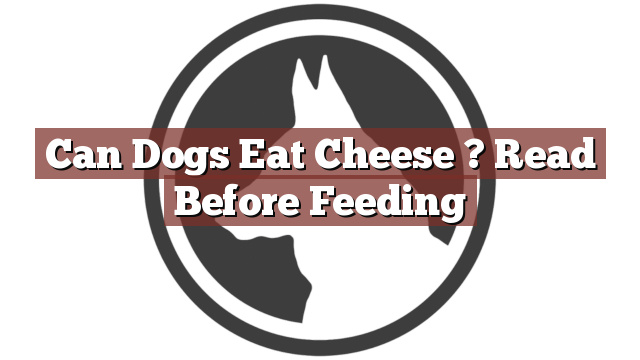Understanding Your Dog’s Dietary Needs
As a responsible dog owner, it is crucial to understand your furry friend’s dietary needs. While dogs are primarily carnivorous, their diets can still include some non-meat items. However, it is important to be cautious about what you feed them, as some human foods can be harmful or even toxic to dogs. Before introducing any new food into your dog’s diet, it is essential to research and consult with your veterinarian to ensure their overall health and well-being.
Can Dogs Eat Cheese? Read Before Feeding
Can dogs eat cheese? This is a common question among dog owners who may want to share a tasty treat with their beloved pets. The answer to this question is yes, dogs can eat cheese, but with some considerations. Cheese can be a good source of protein and calcium for dogs, but it also contains high levels of fat and lactose. Some dogs may have lactose intolerance or sensitivity, which can lead to digestive issues such as diarrhea or upset stomach. Therefore, it is important to introduce cheese to your dog’s diet in moderation and monitor how they react to it.
Pros and Cons of Feeding Cheese to Dogs
Feeding cheese to your dog can have both pros and cons. On the positive side, cheese can be a tasty and nutritious treat for your furry friend. It contains protein, which is essential for their muscle development and overall health. Additionally, cheese is a good source of calcium, which plays a vital role in maintaining strong bones and teeth.
However, it is crucial to be aware of the potential downsides of feeding cheese to dogs. As mentioned earlier, cheese is high in fat and can lead to weight gain and obesity if given in excessive amounts. Moreover, some dogs may have lactose intolerance or sensitivity, which can cause digestive issues. Certain types of cheese, such as blue cheese or those with added ingredients like garlic or onions, can be toxic to dogs. Therefore, it is important to choose a cheese variety that is low in lactose and does not contain any harmful substances.
In Conclusion: Make Informed Choices for Your Dog’s Health
In conclusion, dogs can eat cheese but in moderation and with caution. Before introducing cheese or any new food into your dog’s diet, it is essential to consult with your veterinarian to ensure it aligns with their specific dietary needs. Choose low-lactose cheese options and avoid those with harmful additives. Monitor your dog’s reaction to cheese and look out for any signs of digestive issues or allergies. By making informed choices about your dog’s diet, you can ensure their overall health and well-being. Remember, a happy and healthy dog is a cherished companion for years to come.
Thank you for taking the time to read through our exploration of [page_title]. As every dog lover knows, our furry friends have unique dietary needs and responses, often varying from one canine to another. This is why it's paramount to approach any changes in their diet with caution and knowledge.
Before introducing any new treats or making alterations to your dog's diet based on our insights, it's crucial to consult with a veterinarian about [page_title]. Their expertise ensures that the choices you make are well-suited to your particular pet's health and well-being.
Even seemingly harmless foods can sometimes lead to allergic reactions or digestive issues, which is why monitoring your dog after introducing any new food item is essential.
The content provided here on [page_title] is crafted with care, thorough research, and a genuine love for dogs. Nevertheless, it serves as a general guideline and should not be considered a substitute for professional veterinary advice.
Always prioritize the expert insights of your veterinarian, and remember that the health and happiness of your furry companion come first.
May your journey with your pet continue to be filled with joy, love, and safe culinary adventures. Happy reading, and even happier snacking for your canine friend!

